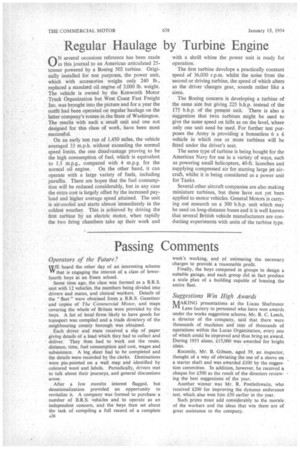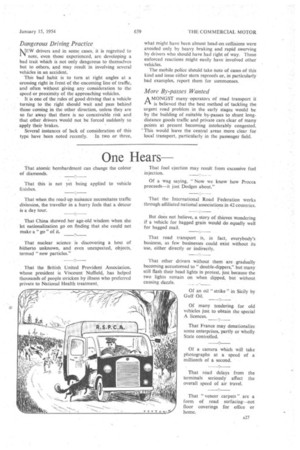Passing Comments
Page 28

Page 29

If you've noticed an error in this article please click here to report it so we can fix it.
Operators of the Future?
WE heard the other day of an interesting scheme vv that is engaging the interest of a class of lowerfourth boys at an Essex school,
Some time ago, the class was formed as a B.R.S. unit with 12 vehicles, the members being 'divided into drivers and mates, and clerical workers: Details of the " fleet " were obtained from a B.R.S. Gazetteer and copies of The Commercial Motor, and maps covering the whole of Britain were provided by the boys. A list of local firms likely to have goods for transport was compiled and a trade directory of the neighbouring county borough was obtained.
Each driver and mate received a slip of paper giving details of a load Which they had to collect and deliver. They then had to -work out the route, distance, time, fuel consumption and cost, wages and subsistence. • A log sheet had to be completed and the details were recorded by the clerks. Destinations were pinpointed on a wall map and identified by coloured wool and labels. Periodically, drivers met to talk about their journeys, and general discussions arose.
After a few months interest flagged, but denationalization provided an opportunity to revitalize it. A company was formed to purchase a number of B.R.S. vehicles and to operate as an independent concern, and the boys then set about the task of compiling a full record of a complete A26 'week's working, and of .estimating the necessary charges to provide a reasonable profit.
Finally, the boys competed in groups to design a suitable garage, and each group did in fact produce a scale plan of a building capable of housing the entire fleet.
Suggestions Win High Awards
MAKING presentations at the Lucas Shaftmoor Lane factory to personnel who have won awards under the works suggestion scheme, Mr. R. C. Leech, a director of the company, said that there were thousands of machines and tens of thousands of operations within the Lucas Organization, every one of which could be improved and thus bring an award. During 1953 alone, £15,000 was awarded. for .bright ideas.
Recently, Mr. B. Gibson, aged 39, an inspector, thought of a way of obviating the use of a sleeve on a starter shaft and was awarded £100 by the suggestion committee. In addition, however, he received a cheque for £500 as the result of thedirectors review• ing the best suggestions of the year.
Another winner was Mr. R. Postlethwaite, who received £200 for improving the dynamo endurance test, which also won him £50 earlier in the year.
Such prizes must add considerably to the morale _ of the workers and the ideas that win them are of great assistance to the company.
Dangerous Driving Practice
NEW drivers and in some cases, it is regretted to note, even those experienced, are developing a bad trait which is not only dangerous to themselves but to others, and may result in involving several vehicles in an accident.
This bad habit is to turn at right angles at a crossing right in front of the oncoming line of traffic, and often without giving any consideration to the speed or proximity of the approaching vehicles.
It is one of the rules of good driving that a vehicle turning to the right should wait and pass behind those coming in the other direction, unless they are so far away that there is no conceivable risk and that other drivers would not be forced suddenly to apply their brakes, Several instances of lack of consideration of this type have been noted recently. In two or three, what might have been almost head-on collisions were avoided only by heavy braking and rapid swerving by drivers who should have had right of way. These enforced reactions might easily have involved other vehicles.
The mobile police should take note of eases of this kind and issue either stern reproofs or, in particularly had examples, report them for summonses.
More By-passes Wanted
A MONGST many ,operators of road transport it in is believed that the best method of tackling the urgent road problem in the early stages would be by the building of suitable by-passes to shunt longdistance goods traffic and private cars clear of many points at present becoming intolerably congested.
' This would leave the central areas more clear for local transport, particularly in the passenger field.




































































































